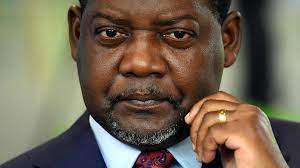The resignation of Firmin Ngrebada comes six months after the re-election of incumbent President Faustin Archange Touadéra.
A former Touadéra chief of staff, Firmin Ngrebada could be reappointed, according to sources close to the presidency.
Ngrebada’s appointment as Prime Minister two years ago was the result of the Khartoum peace agreement of February 2019 between the government, which delegation he led, and the Coalition of Patriots for Change (CPC), a group of armed groups that wanted to overthrow President Touadéra.
Ngrebada remained in the Prime Minister’s office after Touadéra’s re-election in December 2020 with 53.16 percent in a disputed election, marred by “fraud” according to the opposition and in which less than one in three voters was able to participate.
Touadéra came to power on March 30, 2016 after a transition of more than two years (January 2014 – March 2016) of Catherine Samba-Panza, and has to face attacks from armed groups coalesced around the Coalition of Patriots for Change, who are trying to overthrow his regime.
Since 2013, the country has fallen into a third civil war against the backdrop of inter-communal conflict between the Seleka militia and Christian and animist self-defence groups, the anti-balaka.
Power game between Moscow and Paris
Supported by the 12,000 well-equipped peacekeepers under the UN Mission in the Central African Republic (MINUSCA) and hundreds of Rwandan soldiers, Touadéra has reversed the balance of power with the reinforcement by Russian paramilitaries dispatched by Moscow at the end of December.
Russia, the country Touadéra has turned to since coming to power, is waging a struggle for influence against France, the former colonial power.
The cause of this rivalry is the richness of the Central African Republic’s deposits of copper, diamonds, gold, graphite, ilmenite, iron ore, kaolin, cyanite, lignite, limestone, manganese, monazite, quartz, rutile, salt, tin and uranium.
Those mineral resources whet appetite and pushed the Kremlin to multiply its investments in mineral extraction and military cooperation.
At a time when Paris is freezing its budgetary aid and suspending military cooperation with the Central African Republic, judged to be “complicit” in an anti-French campaign directed by Russia.
With the support of the over-equipped Russian army, the undermanned CAR army has managed to retake control of a large part of two-thirds of the territory previously controlled by rebel groups.
A week before his resignation, the Prime Minister travelled to St Petersburg, Russia, to attract more Russian investment to the country.
As the central African state becomes mired in civil war, a humanitarian crisis has taken hold in the country, causing a “food insecurity situation” according to the UN.
630,000 of the country’s 4.9 million people are in emergency situations and are at risk of “withdrawing their children from school or resorting to begging,” according to the UN Food and Agriculture Organisation (FAO) and the World Food Programme (WFP).
CD/lb/as/APA


